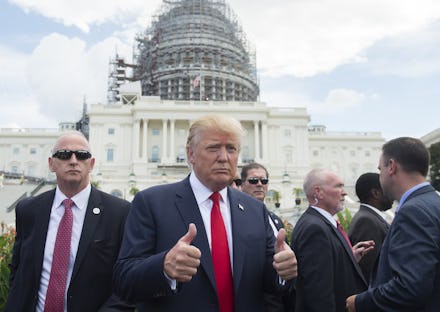What does impeachment actually mean? How Donald Trump could be removed from power

The impeachment process is arduous and, for President-elect Donald Trump, it's unlikely, especially given the Republicans hold the House of Representatives. No president has ever been removed from office. But given the nature of this presidential campaign and Trump's unprecedented liabilities, understanding the process to remove a president is important.
Why are we even talking about impeachment?
To be clear: It is extremely unusual and premature to discuss impeachment at this point. Trump has yet to name his cabinet and is two months away from being inaugurated as the United States' 45th president.
But Trump is a very unusual president-elect. He has been embroiled in thousands of lawsuits all over the country, including a case against Trump University that is expected to go to trial in the coming weeks. Trump has billions of dollars worth of business interests around the world, linking him to foreign leaders. He now oversees U.S. agencies that regulate his businesses and have given him contracts. As the Washington Post explained, "Trump's conflicts of interest are without precedent in American presidential history."
The potential for conflicts of interest and corruption, real or perceived, in Trump's administration is beyond the level of any president before him. This does not mean any nefarious influence has or will occur. But it is possible.
What is impeachment?
Impeachment is the first of two steps to remove the president, or other top government officials, from office. The process begins in the House of Representatives, where articles of impeachment can be introduced like any other bill or resolution. The justification for impeachment is laid out in Article II of the U.S. Constitution:
The President, Vice President and all Civil Officers of the United States, shall be removed from Office on Impeachment for, and Conviction of, Treason, Bribery, or other high Crimes and Misdemeanors.
Those articles of impeachment make the case against the president or other government official. If they are approved by a House committee and then by the full House, the articles form the basis of the trial in the Senate. According to Congressional rules, members of the House act as prosecutors in the Senate trial.
If two-thirds of senators vote to convict at the conclusion of the trial, then the official that was impeached will be removed from office. Presidents Andrew Johnson and Bill Clinton are the only presidents that have been impeached. No president has ever been convicted by the Senate and removed from office.
What could Trump be impeached for?
At this point, answering this question is no more than wild speculation. To hear Trump's team tell it, he will "#DrainTheSwamp" in Washington by imposing term limits on Congress and banning federal employees from lobbying jobs immediately after they leave government. And Trump has said his business interests will be put in a blind trust managed by his children that he cannot access.
But a blind trust run by Trump's family, who will reportedly play key, if unofficial, roles in his administration, would not truly be blind. And Trump's entanglement in lawsuits and financial interests will not disappear once he becomes president. Further, it is difficult to believe Trump will cut all ties to the financial success he used to justify his presidential candidacy.
For now, all we can do is wait as Trump says he does a "fantastic" job building out his cabinet and laying plans to implement his policies.